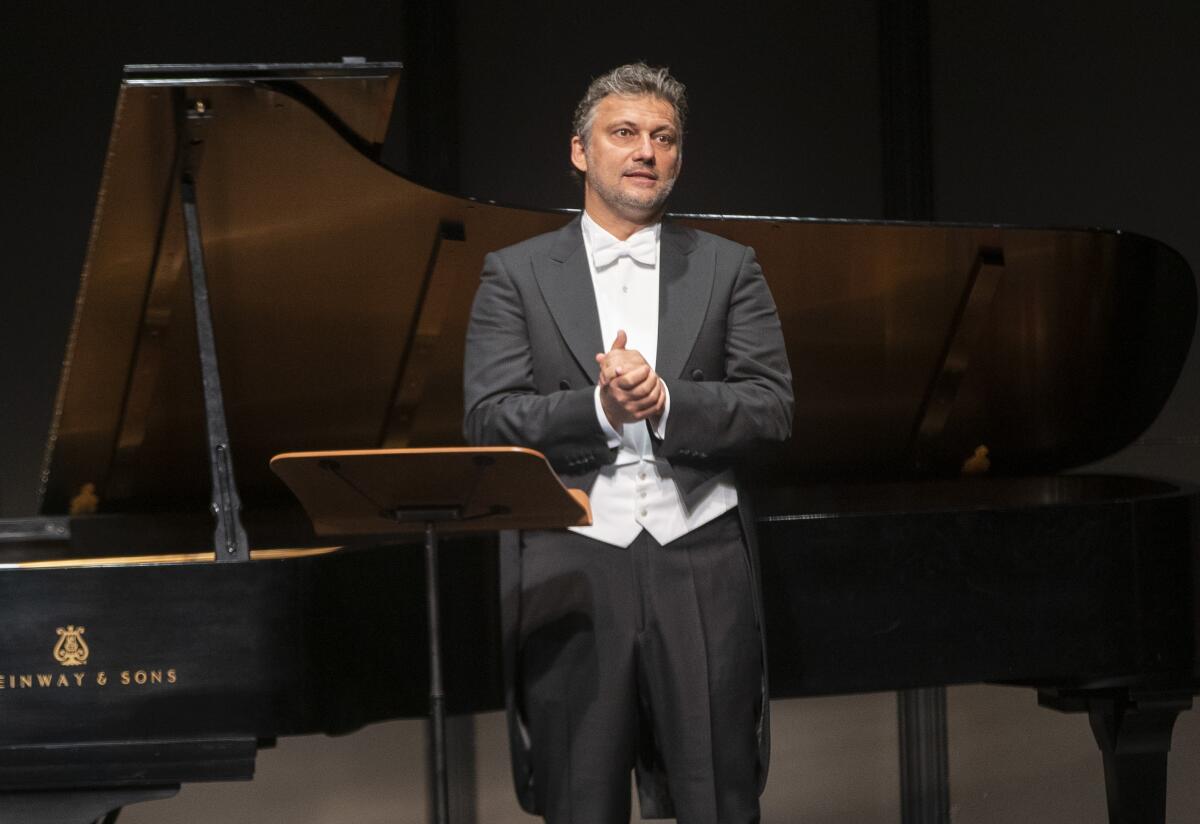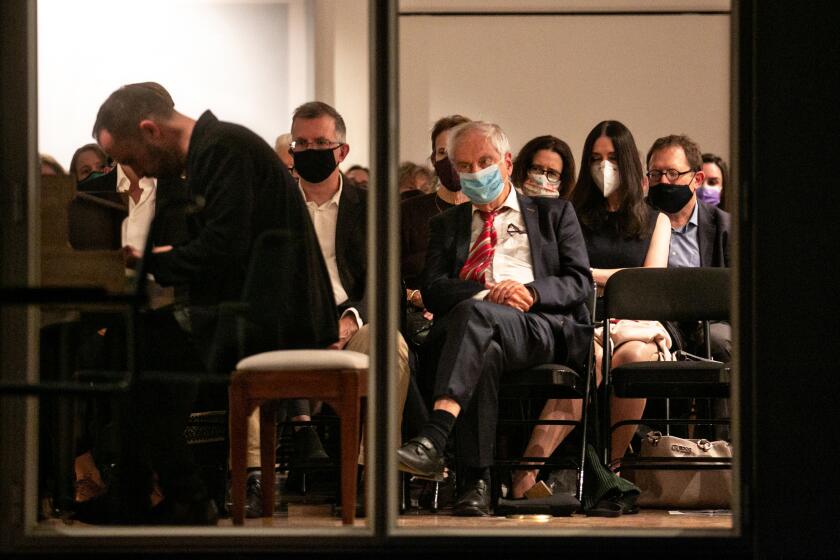Review: After cancellations in Europe, tenor Jonas Kaufmann brings his ‘poison’ to the Broad Stage

- Share via
Jonas Kaufmann is in many ways the model modern tenor.
One of the world’s leading opera stars, he has dashing George Clooney-esque looks. He’s a more than capable actor who was an affecting Tristan this summer in an emotionally stark Bavarian State Opera production, streamed from Munich. He is at home with big Verdi roles and intimate Schubert songs. He can spread the schmaltz in Viennese operetta as thick as you like. He’s got a sure-to-be top-charting Christmas album in the hopper.
In person, he can be a charmer. In a rare recital at the Broad Stage in Santa Monica on Thursday night, Kaufmann revealed an impressively robust, focused, heroic voice that is particularly effective when scaled down to a whisper that seems to say, “Yes, I really care.” The caring extends to text, each and every word of it. If opening his innermost feelings can come close to shtick, at least he has them.
Overall, it’s a full tenor package, the likes of which we haven’t seen since the fall of Plácido Domingo. (In case you are wondering, Russia has not rolled up the welcome mat, and Domingo is in Moscow holding his Operalia competition.)
The German tenor is also, however, the model of an old-fashioned, old-world, European classical singer. He and his accomplished accompanist, Helmut Deutsch, retain the white tie and tails of yore, and Kaufmann carries it off with élan. His program — sung without intermission as part of the theater’s COVID-19 protections — was divided among Liszt songs in the first half and a mixed bag of what he described as his favorite songs, which ranged from obscure to hackneyed, all European, all sung in German and nothing from even close to our time.
Kaufmann put his heart into everything. That is when he wasn’t dispensing heart-stopping deadly poison.
“My songs are poisoned,” was the first line he sang, in Liszt’s song of that title. “How could they not be?” Sang is too polite. He screamed it with a tortured, chalk-on-blackboard shrill that hurt the ears.
This is also the first song on his new recording of neglected Liszt songs. When it came out a couple weeks ago, I started to listen with headphones at moderate volume, and I immediately took them off. Compared with Joy Crookes’ seductive “Poison” on her new album, “Skin,” Kaufmann seemed as though he had converted to heavy metal, or, at age 52, he had a voice that was shot.
In fact, there has been some concern about his voice of late. Kaufmann canceled performances in Munich last month because of a tracheal infection. Still, he was able to embark on an American recital tour that included Carnegie Hall in New York, the Kennedy Center in Washington, D.C., and Berkeley. The infection may or may not have had something to do with the harshness he displayed at full, house-filling volume Thursday.
Coronavirus may have silenced our symphony halls, taking away the essential communal experience of the concert as we know it, but The Times invites you to join us on a different kind of shared journey: a new series on listening.
I immediately recoiled again as Kaufmann produced his “poison” live — but not for long this time, the song having become theater. Kaufmann made it crystal clear that he meant what he said. In the Heine text that Liszt set, the poet’s heart is beset by “many serpents / and you, my beloved.” Kaufmann wasn’t kidding.
The Liszt songs, which Kaufmann in his remarks to the audience credited to Deutsch for having brought to his attention, are finds. He sang nine of the 20 on the recording. They include marvelously atmospheric invocations of the Rhine and Cologne’s great cathedral, pealing bells, a Lorelei luring a sailor to the bottom of the sea and many a love-lost tale.
Kaufmann approached all as dramatist (someone should employ him to do an audiobook), song ever in service of story. He was one minute oracular, another having a personal moment with inner thoughts. He overacted, but these are old songs whose sentiments can use some help. Although he reached out to those of us seated close to him, he aimed for the balcony most of the time, as if he were still in Carnegie Hall or the Kennedy Center and not a theater a quarter the size.
When I looked up to the balcony, I realized why. Kaufmann’s well-heeled opera fans around me were predisposed to dote on their star, close up in a rare appearance. Upstairs was packed with an array of students. Not many of them could ever have experienced just how incredible a great, unamplified voice can be. It was from the rafters that came the loudest, most enthusiastic cheers. And these for an old-fashioned Lied recital on the day before Liszt’s 210th birthday.
The second half of the program was shamelessly old school. Sentimental chestnuts — Dvorak’s “Songs My Mother Taught Me” and a Brahms lullaby — were peppered among Schubert’s chirpy “Der Musensohn” (Son of the Muses), Schumann’s wrenching “Widmung” (Dedication) and so on.
The formal program ended with the end of the world and Mahler’s — and to my mind, any composer’s — most moving song, “Ich Bin der Welt Abhanden Gekommen” (I Am Lost to the World). Kaufmann wasn’t lost to the world but very much of it. He allowed Deutsch to set the otherworldly tone and sang with welcome restraint and feeling.
He wasn’t, however, ready to say goodbye, not with six encores yet to deliver. There was more Liszt, Richard Strauss’ “Nichts” and sugary Viennese operetta sending us home humming, the poison two hours earlier seeming to have been nothing more than a placebo.
I’ve since listened through all of Kaufmann’s Liszt recording. It’s full of wonders. As for the Christmas album out soon, if it’s anything like his Christmas album last year, there’s worse.
Igor Levit inaugurates the historic return, after 70 years, of Thomas Mann’s piano to the Brentwood home that hosted film and literary luminaries.
More to Read
The biggest entertainment stories
Get our big stories about Hollywood, film, television, music, arts, culture and more right in your inbox as soon as they publish.
You may occasionally receive promotional content from the Los Angeles Times.













